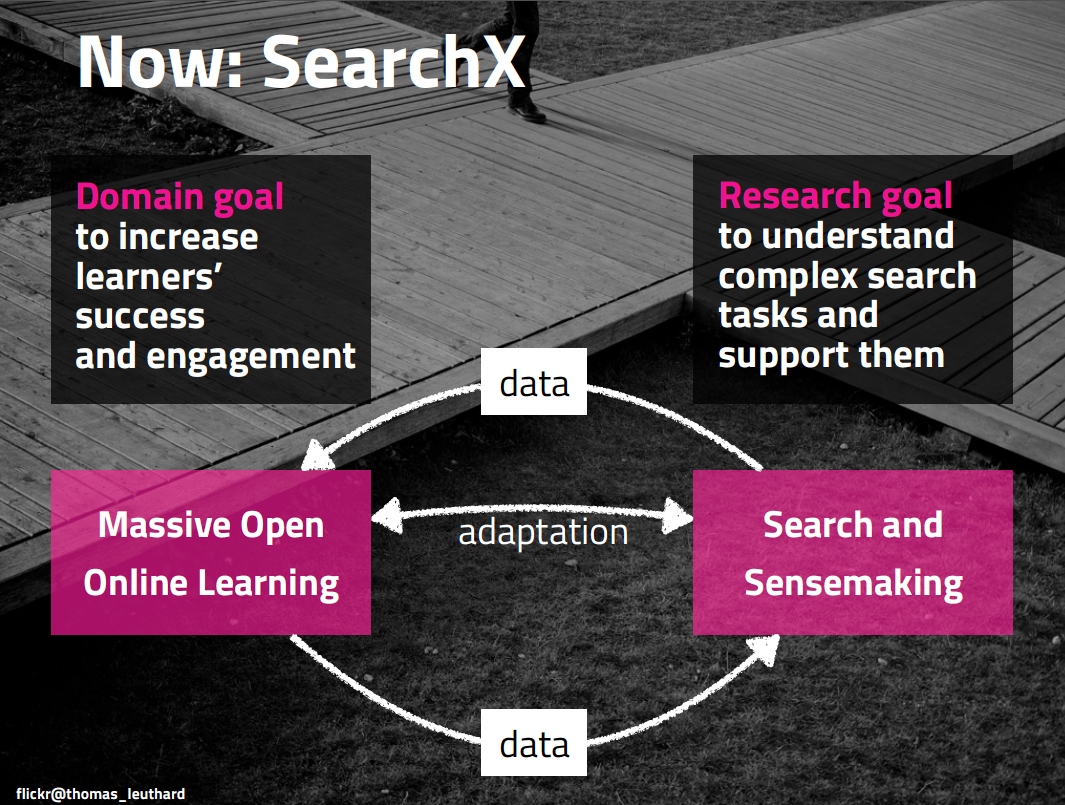NWO VIDI Awarded
The Netherlands Organisation for Scientific Research has just announced the proposals that will receive funding through the NWO VIDI scheme. I made it onto this list! The VIDI is a personal grant worth 800K € which translates into 2 PhD and 1 postdoc positions and more research time for me over the next five years. My proposal on Integrating search and sensemaking into large-scale open online learning has two goals:
- Domain goal: To significantly increase learners’ engagement and success in online learning through the design of novel search-based and search-informed learning interventions.
- Research goal: To significantly increase our understanding of complex search tasks which at this point in time is quite fragmented through the design of a battery of large-scale and longitudinal experiments exploring the main facets that define complex search tasks. In IR this research direction is also known as search as learning.
and two sub-projects (1 PhD/project) which are in sync with those two goals:
- Complex search for learning will explore the information needs associated with learning and how to support them.
- Beyond the MOOC platform will explore interventions that are informed by data (user-generated search logs) from outside the online learning platform.
Alternatively expressed in shiny grant interview slide:

Complex Search for Learning
In this sub-project search takes the center stage with the promise that a better search experience informed by learners’ activities on the learning platform will enable them to learn more efficiently and as a consequence be more successful. The observation and analyses of MOOC learners’ behaviors and actions in a standard search system embedded into MOOCs provides the foundation for our two approaches to improve complex search: personalization of search results and search interface components based on learners’ abilities and context.
Beyond the MOOC Platform
In this sub-project the focus shifts to the learning aspect itself and how it can be informed by learners’ search activities. In recent years, research focusing on large-scale learning has gained tractio. However, despite many ongoing efforts, retention rates and learner engagement remain low. I believe the main reason for this lack of progress resides in the type of interventions explored in MOOCs today: interventions tend to be well-grounded in educational theories and educational psychology but lacking in (technological) ambition; examples include the use of questionnaires to recommend learning strategies, the distribution of badges to encourage learner participation or formative in-video quizzes. None of these examples radiate an ambition to “upset” and alter the existing MOOC course design. Unsurprisingly then, an often reported outcome of these studies is a lack of engagement with the introduced interventions by a large percentage of MOOC learners. In this sub-project we explore computational approaches to infinite assessment at scale (using IR technologies), the augmentation of learner models with search log traces (to develop more adaptive MOOCs) and metrics to measure learning.
Project Execution
The research themes explored in both sub-projects require considerable engineering effort. The developed novel interventions and search components will be open-sourced and deployed and evaluated in a “living lab”, an evaluation paradigm which has gained significant traction in IR. It offers a principled way to integrate users (MOOC learners) in the research process and enables research collaborations that are aware of the data and privacy issues surrounding user-generated traces. All research conducted in this project will be mixed methods, combining qualitative and quantitative empirical approaches. All engineered components will be deployed in randomized controlled trials in at least two MOOCs in order to provide generalizable insights.